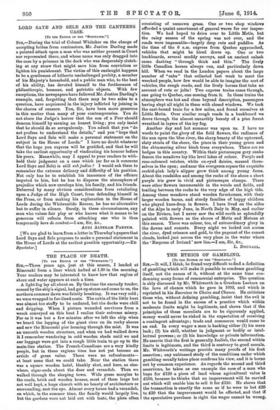THE PLACE OF DEATH.
[To TON EDITS. OF Tss " SPFCT■7011...] SIR,—Three years ago, just at this season, I landed at Rimouski from a liner which halted at 1.30 in the morning. Your readers may be interested to know bow that region of shore and water appears at such a time.
A light fog lay all about us. By the time the unready tender, roused by the ship's signal, had got up steam and come to us, the northern summer dawn was faintly breaking. It was very cold ; we were wrapped in fur-lined coats. The cabin of the little boat was almost too stuffy to be endured, but the decks were chill and dripping. When I picture wounded survivors from a wreck conveyed on this boat I realize their extreme misery. For us it was but a few minutes after we left the ship when we heard the lapping of the giant river on its rocky shores and saw the Rimouski pier looming through the mist. It was an uncouth wooden structure, and when we had walked down it I remember wandering in cold wooden sheds until we and our luggage were got into a rough little train to go up to the main-line station. The French-Canadians are a very kindly people, but in these regions time has not yet become an article of great value. There were no refreshments— at least none that we could take. Near the station there was a square wooden hotel, blankly shut, and here, as else- where, cigar-ends about the door and verandah. Then we walked through the sleeping town. Wide grass margins to the roads, brick and wooden houses, most of them large but not well kept, a huge church with no beauty of architecture or surrounding, met the eye. Almost every house hada verandah, on which, in the summer time, the family would largely live, but the gardens were not laid out with taste, the plots often consisting of unmown grass. One or two shop windows afforded a quaint assortment of general wares for our inspec- tion. We had hoped to drive over to Little Metis, but the rainy season of the spring was not over, and the roads were impassable—largely deep ruts and puddles. As the time of the 6 a.m. express from Quebec approached, vehicles that might be hired drove up. One or two buckboards, several muddy surreys, and an ancient calash came dashing " through thick and thin." The lively little Canadian horses always run, and particularly down hill. When we read in the London papers about the large number of "cabs" that collected last week to meet the wrecked people, how few would be able to imagine the sort of vehicles, the rough roads, and the lively horses that take no account of rata or jolts! Two express trains came through, one going to Quebec, one coming from it. In these trains the atmosphere was hot and close beyond description, passengers having slept all night in them with closed windows. We took the east-bound train for a few miles, and found ourselves at Little Metis. Over similar rough roads in a buckboard we drove through the almost unearthly beauty of a pine forest wreathed in layers of the icy fog.
Another day and hot summer was upon us. I have no words to paint the glory of the field flowers, the radiance of the sun upon the blue river, the sharp beauty of the upturned, slaty strata of the shore, the pines in their young green and the shimmering silver birch trees everywhere. There are no hedges in this country. Within their picturesque grey snake fences the meadows lay like level lakes of colour. Purple and rose-coloured vetches, white ox-eyed daisies, massed them- selves in the open; andnear the evergreen copses the exquisite orchid-pink lady's slipper grew thick among young ferns. About the roadsides and among the rocks of the shore a short purple iris grew in vivid and picturesque clumps. There were other flowers innumerable in the woods and fields, and trailing between the rocks to the very edge of the high tide. Among these meadows stood wooden farmhouses, with their larger wooden barns, and sturdy families of happy children who played knee-deep in flowers. I have lived on the sides of the Alps in early June, in North Italy in May, and earlier on the Riviera, but I never saw the wild earth so splendidly painted with flowers as the shores of Metis and Metane at this season. There was colour, too, of extraordinary glory in the dawns and sunsets. Every night we looked out across the river, dyed crimson and gold, to the pageant of the sunset clouds, looked just across the very place in the water where the 'Empress of Ireland' now lies.—I am, Sir, &c., L. DOI:KULL.










































 Previous page
Previous page